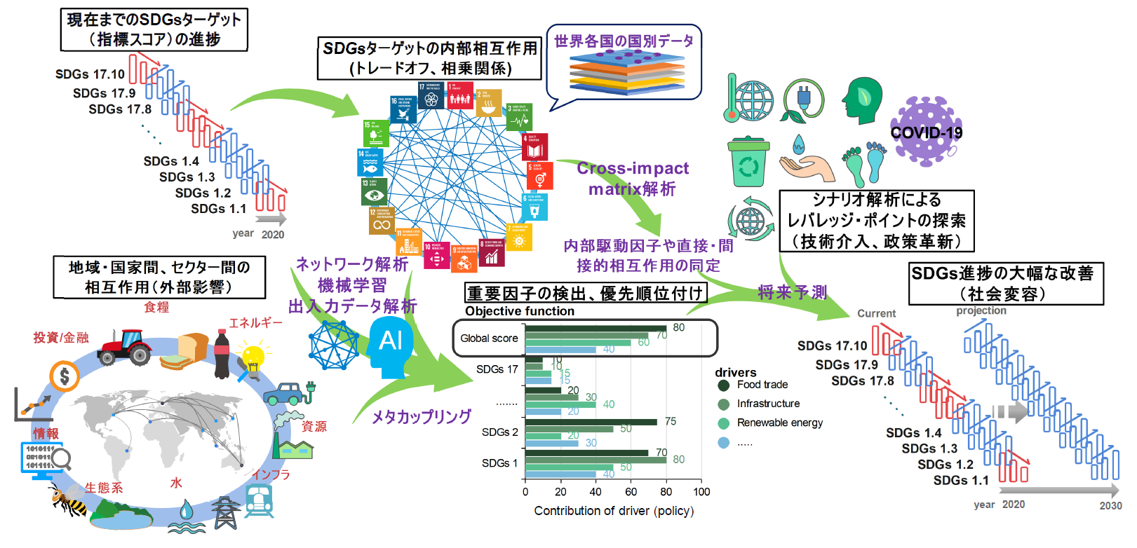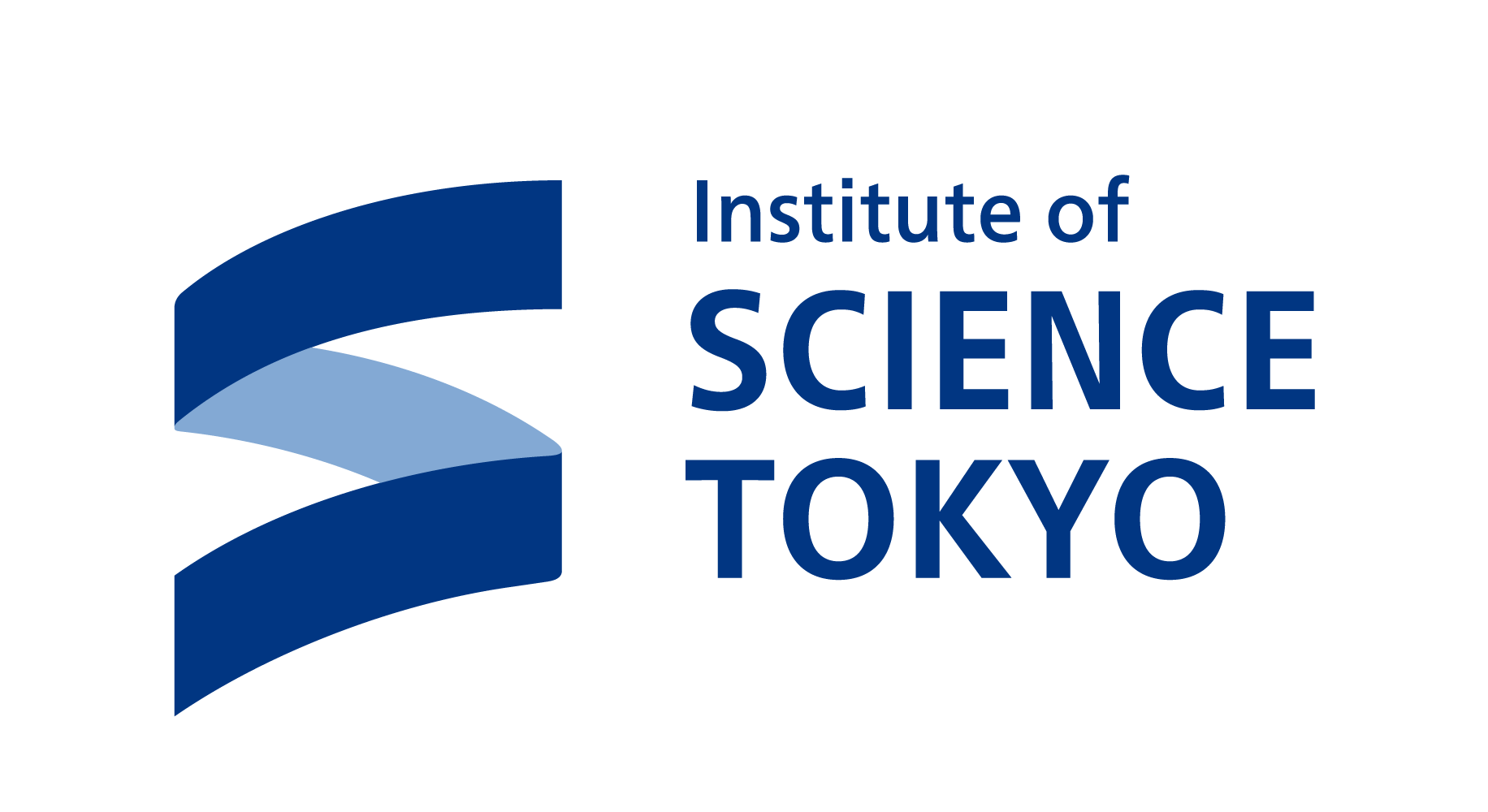
持続可能な開発におけるレバレッジ・ポイントの探索 / Exploring leverage points in sustainable development
【持続可能な開発におけるレバレッジ・ポイントの探索 / Exploring leverage points in sustainable development】
持続可能な社会への移行は、人新世(Anthropocene)において人類が直面している重要な課題です。2015年の国連総会で採択された「持続可能な開発のための2030アジェンダ」は、その羅針盤となる行動規範・目標ですが、2030年までに多くの国々で持続可能な開発目標(SDGs)は達成されないと予想されています。すなわち、現在までに世界各国で実施されてきた持続可能に関する様々な取り組みでは不十分で、17の目標すべてにおいて進捗を大幅に改善できるような国際社会の変容が求められています。しかし、「社会の変容とはどういったものなのか?」、これまでに明確には示されていません。
持続可能な社会への移行における重要な考え方の一つに「レバレッジ・ポイント(介入点)」があります。一見、環境・社会システムへの小さな介入ですが、大きな波及効果、さらにシステム全体の変容をもたらす可能性のある介入です。介入の方法としては新たな政策の実施、投資、技術の導入など様々なアプローチが考えらます。国際社会を俯瞰し、社会、経済、環境、グローバル・ローカルな文脈など様々な要素を包摂的に捉え、適切なレバレッジ・ポイントを見出した上で、持続可能な社会への移行手段を提示していく必要があります。
以上から、この研究では、社会・経済・環境的要素ならびに国際的なモノの流れや資源消費(フットプリント)等を考慮したうえで、世界各国におけるSDGsの進捗との関係性を明らかにし、SDGsの大幅な進捗改善に資するレバレッジ・ポイントを見出すことを目的としています。具体的には、内部相互作用解析や外部影響解析、シナリオ解析などの種々の解析を通して、SDGsターゲット(指標スコア)をノード、内外的相互作用をリンクとしたネットワークシステムモデルを開発し、SDGsの進捗評価や政策の効果などを多面的に検証していきます。
The 2030 Agenda for Sustainable Development, adopted by the United Nations General Assembly in 2015, is a code of conduct and goal that will serve as a compass for the transition to a sustainable society in the Anthropocene, but by 2030, many countries are expected to be unable to achieve the Sustainable Development Goals (SDGs). In other words, the various sustainability initiatives that have been implemented to date around the world are not sufficient, and the global society needs to be transformed so that progress on all 17 goals can be significantly improved. But, “what does social transformation look like?” has not been clearly articulated to date.
One of the key ideas in the transition to a sustainable society is the “leverage point” (intervention point), which is seemingly small interventions in environmental and social systems, but the interventions that have the potential to have large ripple effects and even system-wide transformation. Interventions can take a variety of approaches, including the implementation of new policies, investment and technology. It is necessary to take a bird’s-eye view of the international community, taking into account various factors such as social, economic, environmental, and global/local contexts in an inclusive manner, to find appropriate leverage points, and to propose the means of transition to a sustainable society.
The purpose of this study is to clarify the relationship between the SDGs progress in the world and social, economic, and environmental factors (e.g., international flows of goods and resource consumption footprint), and to find a leverage point that will contribute to a significant improvement in progress toward the SDGs. Specifically, through a variety of analyses, including internal interaction analysis, external impact analysis, and scenario analysis, we will develop a network system model with SDG targets (indicator scores) as nodes and internal/external interactions as links, and will evaluate the progress of the SDGs and examine the effects of policies from multiple perspectives.

COVID-19がSDGsの進捗に及ぼす影響が懸念される中、まずはCOVID-19の影響評価を目的とした解析に着手しています。2020年7月末までに国際機関(国連やWHO、WTO、ILOなど)から公開されている、SDGsに関連する28の指標(エネルギー需要、インターネットアクセス、国際貿易、COVID-19感染者数、GHG排出量、大気汚染、食糧価格、学校閉鎖、所得減、失業、製造など)を収集し、各指標がSDGsへ及ぼす正と負の影響を考慮して、SDGs目標に割り当て、さらに各指標値について、2020年2月以前に対する2020年3月以降の比率を算出し、COVID-19が各SDGs目標の進捗(推進もしくは後退)に及ぼす影響を定量評価しました(左図)。その結果、本データセットに基づく解析では、目標7(エネルギー)や13(気候変動)において正の影響がみられましたが、一方で、目標1(貧困)や8(経済成長)、12(製造)、17(パートナーシップ)について、COVID-19は大きな負の影響を及ぼすことが示唆されました。地域傾向を見てみると、特にCOVID-19が拡大しつつあるアフリカ地域や南米地域においてSDGsの大幅な後退が観察されました(右図)。以上は予備的な結果でありますが、COVID-19がSDGsの進捗に強く関わり、COVID-19の負の影響から回復するための政策介入等の提案において、重要な知見を提供します。
Amidst concerns about the impact of COVID-19 on progress on the SDGs, we have begun an analysis aimed at assessing the impact of COVID-19. 28 indicators related to the SDGs available by the end of July 2020 from international organizations (such as the United Nations, WHO, WTO and ILO), including energy demand, Internet access, international trade, number of people infected with COVID-19, GHG emissions, air pollution, food prices, school closures, income decline, unemployment, manufacturing, etc.) are collected and assigned to the SDG targets, taking into account the positive and negative impact of each indicator on the SDGs. Then, we quantified the impact of COVID-19 on the progress (promotion or regression) of each SDG target by calculating the ratio after March 2020 (left panel). The results of the analysis based on this dataset suggest that COVID-19 has a positive impact on Goal 7 (energy) and 13 (climate change), while COVID-19 has a significant negative impact on Goals 1 (poverty), 8 (economic growth), 12 (manufacturing) and 17 (partnership). Looking at regional trends, significant regression of the SDGs was observed, particularly in Africa and South America, where COVID-19 is expanding (see right panel). While these are preliminary results, they provide important insights into the strong engagement of COVID-19 in the progress of the SDGs, and in proposals for policy interventions and other measures to recover from the negative impacts of COVID-19.


